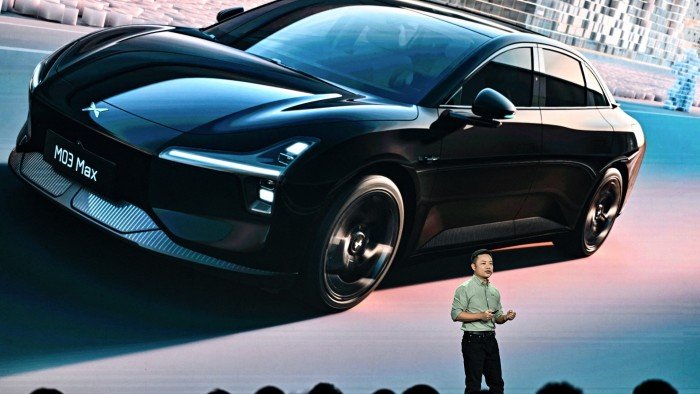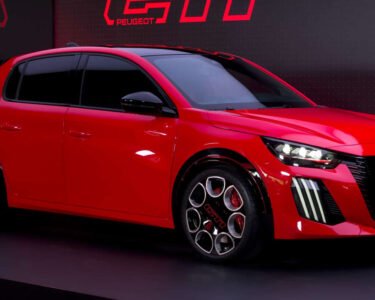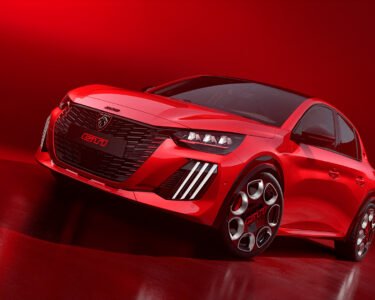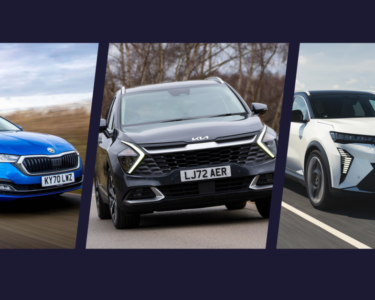Stay informed with free updates
Simply sign up to the Electric vehicles myFT Digest — delivered directly to your inbox.
Chinese carmaker Xpeng says it has developed chips for autonomous driving that are more powerful than Nvidia’s products and it expects Volkswagen and other auto rivals to be customers.
He Xiaopeng, Xpeng’s co-founder and chief executive, said it was working to integrate its self-designed Turing artificial intelligence chip into select car models VW planned to launch in China next year.
“Developing chips is fundamentally a long-term commitment, as Xpeng envisions doing a lot of things across cars, aircraft and robotics. We need a type of chip that can support these platforms and also power our [AI] large language model,” he told the Financial Times in an interview.
The company was also in discussions to supply chips to other car manufacturers. “We are looking for long-term partners,” he said. Following the interview, Xpeng clarified that talks with VW and other companies about using the chips were ongoing.
A VW spokesperson in China said: “As announced, Volkswagen and Xpeng are jointly developing two Volkswagen brand cars for the mid-class segment. Both parties contribute their respective strength. These cars will be launched next year.”
Xpeng’s new product is the latest sign of progress in chip design in China, which has for decades sought to reduce its dependence on foreign-made semiconductors. In the auto sector, high-end AI chips are increasingly needed to develop and run advanced driver assistance and autonomous driving systems.
Xpeng’s decision to sell its chip technology to rival carmakers also reflects the deepening reliance of foreign auto groups on Chinese technology amid a period of intense competition as China transitions to electric vehicles. Global carmakers have also tried, but struggled, to develop chips in-house to reduce their reliance on technology groups, especially in the wake of the Covid-19 chip shortage.
In 2023, the German group invested $700mn for a 5 per cent stake in Xpeng, part of a broader plan to survive as the world’s biggest car market transitions to EVs. Hundreds of VW engineers have been working with Xpeng’s in their respective plants in Hefei and Guangzhou to improve the German group’s smart-driving expertise.
Xpeng is ploughing Rmb5bn ($700mn) a year into developing AI-related technologies — about half of the Guangzhou-based group’s total research and development spending. This had helped Xpeng become the first Chinese carmaker to launch autopilot functions for expressways and a fully voice-controlled smart cabin system, said He.
Seated in the newly unveiled G7 sport utility during the interview, the 47-year-old asked the in-car voice assistant, dubbed “Little P”, to increase the air conditioner’s fan speed.
He then pointed to two Turing chips installed beneath the front armrest and one more under the passenger-side footwell and said they boasted computing power of 2,200 tera-operations per second (TOPS) — a metric to measure how many trillion operations a processor can perform in one second.
A typical TOPS range for vehicles available in the Chinese market is between 80 and 700, implying Xpeng’s latest model is three to 28 times more powerful than most of its rivals, He said.
“The effective computing power of the Turing AI chip is three times greater than that of the leading autonomous driving chip, Orin-X,” He claimed at a launch event for the G7 car on Wednesday, referring to the processor made by American tech group Nvidia.
Xpeng aims to scale its chip business to recoup its substantial investments in recent years. “Someone told me that selling 1mn chips would make the business profitable. But I’ll wait until we actually hit 1mn before deciding if that holds true,” He said.
In the auto sector, Xpeng is among a clutch of Chinese companies challenging western groups such as Nvidia and Qualcomm. They include EV maker Nio, tech group Huawei, Horizon Robotics and Black Sesame Technologies.
As of the end of April, Xpeng had 6 per cent of pure battery EV sales in China, trailing only BYD, Geely, SAIC, Tesla and Chang’an in market share, according to Automobility data.
Additional reporting by Kana Inagaki in London




